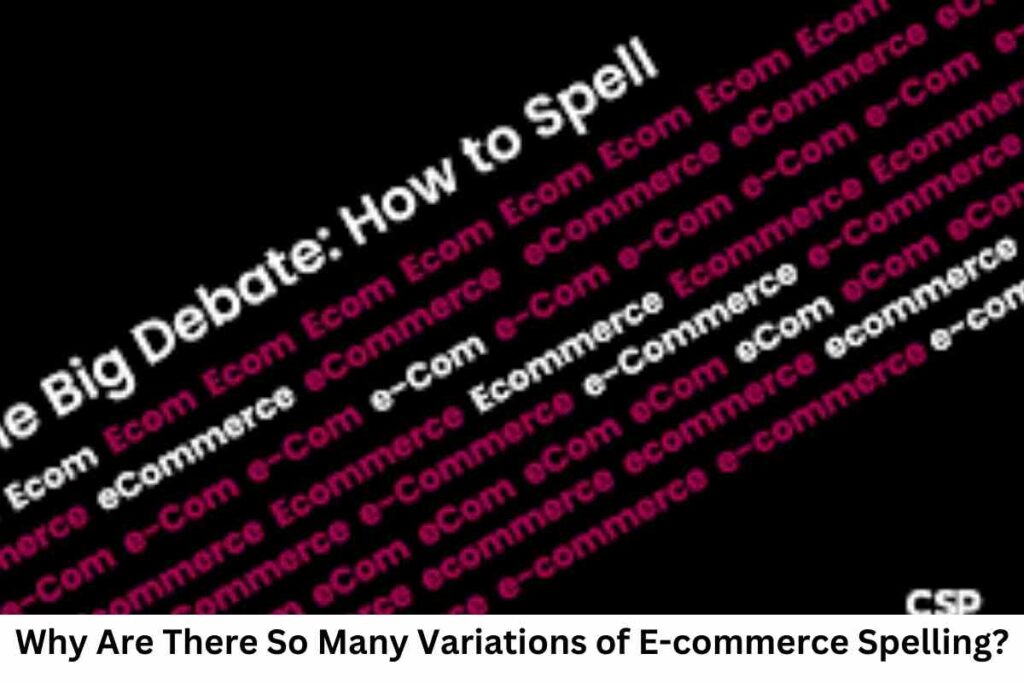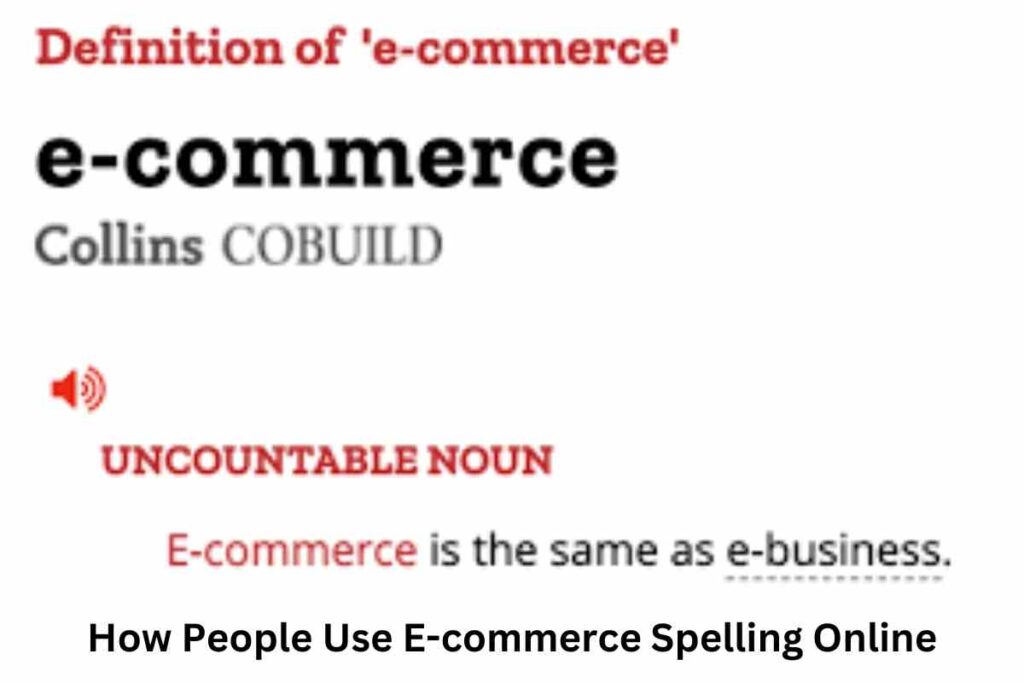The correct spelling is e-commerce in formal writing and ecommerce in digital marketing. Use it consistently across your website, marketing materials, and documents to maintain professionalism, SEO clarity, and audience trust.
Whether you are writing for academic, branding, or digital marketing purposes, this guide explains all spelling variations, style guide preferences, and real-world usage trends so you never get it wrong.
What Is E-commerce?

E-commerce, short for electronic commerce, refers to the buying and selling of goods or services over the internet.
It includes four main types of transactions (covering a PAA question):
- Dropshipping: Selling products without holding inventory.
- B2C (Business-to-Consumer): Online shopping like Amazon or Shopify.
- B2B (Business-to-Business): Wholesale or digital supply chain transactions.
- Marketplaces: Platforms such as eBay, Etsy, AliExpress.
Why Spelling Consistency Matters in E-commerce?
Using one spelling consistently whether e-commerce or ecommerce is more than a style choice; it impacts your brand, SEO, and audience clarity.
- Professionalism: A consistent spelling reinforces trust and makes your content look polished.
- SEO benefits: Search engines favor uniform terminology, which can improve ranking relevance.
- Readability: Readers quickly grasp your content without confusion or distraction.
Example: If your website URLs use ecommerce but the text shows e-commerce, it can confuse users and weaken link authority. Stick to one version across all content, marketing materials, and platforms.
Different Ways to Spell E-commerce
One of the most common questions surrounding How Do You Spell E-commerce is: Which spelling is correct? Various forms exist leading to confusion among business owners marketers and content creators. Here are the most widely used variations:
| Variation | Description |
|---|---|
| E-commerce | The hyphenated version, widely used in formal writing and dictionaries. |
| Ecommerce | A modern, simplified version without a hyphen, popular in digital marketing. |
| eCommerce | Capitalized “E” and “C,” often used in branding and company names. |
| e-commerce | Lowercase version with a hyphen, sometimes used in casual writing. |
| ECommerce | Fully capitalized, mostly seen in company names and branding. |
| E-com | An abbreviated version, occasionally used in informal settings. |
| e-Com | A shortened variation of “e-commerce.” |
Despite these variations e-commerce and ecommerce are by far the most commonly used forms.
The Origins and Evolution of E-commerce Spelling
The term e-commerce has its roots in the 1960s when electronic data interchange (EDI) systems began enabling business transactions to be conducted over long distances.
However the term gained widespread use in the 1990s with the advent of the World Wide Web. As online shopping and business transactions began to rise the term e-commerce was coined to describe these new online transactions.
Initially, there was no standard spelling leading to variations like E-Commerce eCommerce and Ecommerce.
Over time, businesses and industries gradually leaned toward more consistent spelling conventions though no single form has completely dominated.
A Comparison to Other Internet Terms
Comparing E-commerce to Other Internet Terms a helpful way to understand the shift in spelling is by comparing e-commerce to similar internet-related terms:
- Email: Originally e-mail but the hyphen was dropped over time due to widespread usage.
- E-learning: Still commonly hyphenated though “elearning” is gaining traction.
- E-business: Less commonly used but still follows a hyphenated format.
Just like “email” lost its hyphen “e-commerce” is experiencing a gradual transition toward “ecommerce.”
Why Are There So Many Variations of E-commerce Spelling?

The reason for so many different spellings stems from several factors:
- Marketing and Branding: Many companies choose to capitalize letters or omit hyphens to create more distinctive, memorable names (e.g., Shopify or eBay).
- Historical Usage: Early in the development of digital commerce, there were no formal rules for spelling. Different stakeholders—businesses, tech companies, and marketing firms—chose their preferred versions.
- Technological Evolution: As e-commerce grew in popularity, new terminology emerged, leading to changes in spelling. Many platforms like WooCommerce or Magento settled on using eCommerce, while other companies, like Amazon, often use lowercase ecommerce.
The rise of online platforms and digital marketing has also contributed to the adoption of different spellings in various contexts.
Which Spelling Is Correct?
E-commerce vs. ecommerce: Which is the correct spelling? In truth, both spellings are correct, depending on the context:
- “E-commerce” (with a hyphen) is commonly used in formal writing, academic contexts, and by dictionary definitions.
- “Ecommerce” (without the hyphen) has become more popular in digital marketing and online business contexts.
Best Practices for Choosing the Right Spelling
- For academic papers or formal writing: Stick with “e-commerce” as it is widely accepted in dictionaries and style guides.
- For digital marketing, branding, and business websites: Use “ecommerce” as it is more modern, easier to read, and more commonly used online.
Consistency Is Key
The most important factor when deciding which spelling to use is consistency. Once you’ve selected a spelling (whether e-commerce or ecommerce), ensure that you use it consistently throughout your article, website, or business materials.
Spelling Preferences in Dictionaries and Style Guides
Let’s take a look at how major dictionaries and style guides treat the term e-commerce:
- Merriam-Webster: Prefers the hyphenated form “e-commerce”.
- Oxford Dictionary: Uses the hyphenated “e-commerce”.
- Collins Dictionary: Also uses the hyphenated “e-commerce”.
- Britannica: Follows the same pattern with “e-commerce”.
- Associated Press (AP): AP hyphenates terms like “e-commerce” but has specific guidelines based on usage (e.g., email vs. e-mail).
While dictionaries often favor the hyphenated form, many businesses and digital platforms use the simpler “ecommerce” to align with modern branding practices.
How Major Dictionaries & Style Guides Spell It
Here’s how key references treat the term:
- Merriam-Webster: “E-commerce” (hyphenated).
- Oxford Dictionary: “E-commerce” (hyphenated).
- Collins Dictionary: “E-commerce” (hyphenated).
- Britannica: “E-commerce” (hyphenated).
- Associated Press (AP) Style Guide: Recommends “e-commerce” but acknowledges evolving trends.
While dictionaries lean toward “e-commerce,” digital marketing and online businesses favor “ecommerce.
Spelling Trends & Google Search Insights

Analyzing data from Google Trends and Google Ngram Viewer shows that How Do You Spell E-commerce:
- “E-commerce” was dominant in the early 2000s but has steadily declined.
- “Ecommerce” surpassed “e-commerce” in search volume around 2008 and continues to grow.
- “eCommerce” remains popular in branding but is not as commonly searched.
This shift mirrors the general trend of simplifying internet terminology.
This aligns with the growing trend toward simplifying terminology in the digital age. As more businesses and consumers adopt “How Do You Spell E-commerce“, the hyphenated version is becoming less common in search behavior and web content.
Google Trends Insights
| Spelling | Search Volume | Trend (2004-2024) |
|---|---|---|
| E-commerce | High in early 2000s | Declining over time |
| Ecommerce | Surpassed e-commerce after 2008 | Increasing steadily |
| eCommerce | Gaining traction in branding | Stable usage in companies |
Conclusion: What’s the Best Way to Spell E-commerce?
Choosing the correct spelling of e-commerce doesn’t have to be confusing. For formal writing, use e-commerce, while ecommerce works best for digital marketing, SEO, and branding.
Company or brand names can follow capitalization like eCommerce or ECommerce. The most important rule is consistency once you pick a style, use it across all your content, URLs, and materials.
By following these simple guidelines, you ensure your writing is professional, your brand appears trustworthy, and your SEO efforts remain effective.
To learn more about optimizing your digital content and branding, visit Rteetech for actionable strategies and in-depth guides.
FAQS
What is the correct spelling: e-commerce or ecommerce?
Both are correct. E-commerce is formal, while ecommerce is preferred for digital marketing and SEO.
Should e-commerce be hyphenated?
Yes, e-commerce is used in formal writing; ecommerce is standard in digital contexts.
Is the C in e-commerce capitalized?
Only for branding or company names (eCommerce); otherwise, lowercase is correct.
How do you spell e-commerce in English / UK?
E-commerce is preferred formally; ecommerce is widely used online.
How do you spell e commerce on Reddit?
Most users write ecommerce, though e-commerce is also acceptable.
E commerce capitalization?
Capitalize only for company/brand names (eCommerce); otherwise, lowercase.
E Commerce short form?
Informally, Ecom is used; avoid ecomm in professional writing.
How to write e commerce on resume?
Use e-commerce or ecommerce consistently for professionalism.
Ecommerce or e-commerce AP style?
AP style prefers e-commerce, but ecommerce is common in digital marketing.
Does ecommerce have a hyphen?
E-commerce has a hyphen for formal writing; ecommerce does not.
Correct spelling of ecommerce?
Both are correct; choose ecommerce for SEO and e-commerce for formal writing.
How to spell e-commerce?
Use e-commerce in formal contexts and ecommerce for branding or marketing.



